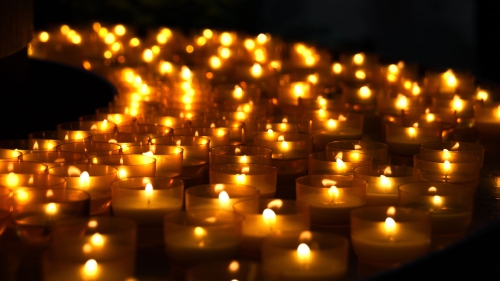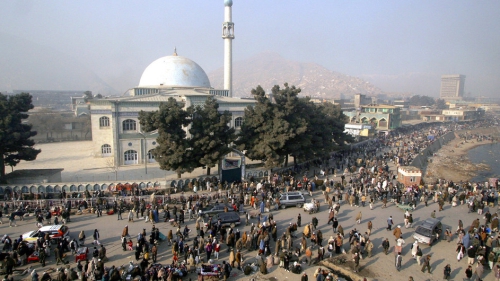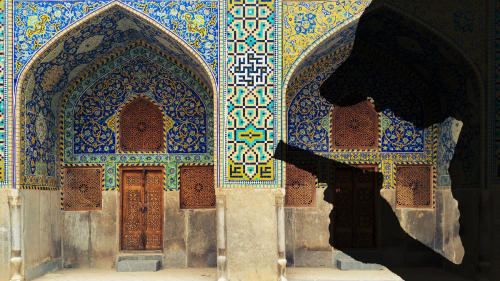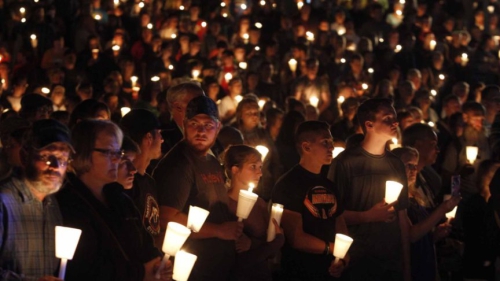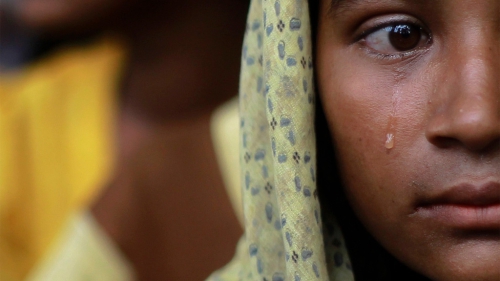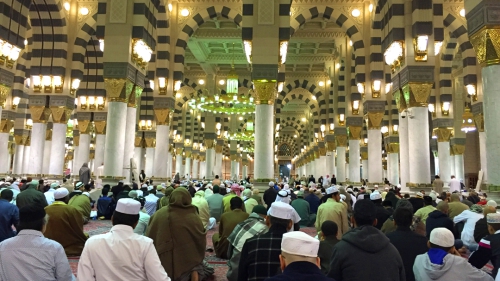Self Reflection on the Movie and Violence
One of the lines in the prayer that Prophet Muhammad made in Taif after being beaten, humiliated and ridiculed in the tenth year of his prophet-hood reads, " O Allah, as long as you are not angry with me, I do not care about their attitude."
An insignificant convicted felon made a disgusting movie about the life of the Prophet. Some of his financial backers were influential evangelical leaders and some of his promoters were the usual Islamophobes. But who cares. Why should one take notice of this nonsense? The purpose of this movie as explained by one of its consultant was to make Muslims hate their religion and renounce it. Did any Muslim really feel disgusted with the character of the Prophet or the sanctity of his religion? Far from that, Muslim masses came out in the streets showing their solidarity with their religion and their love of their prophet. But let us categorically say that the violence that followed and presumably done in the name of Islam and the Prophet was un-Islamic.
At the same time we need to do some self reflection and analyze our own traditions and sources that promote an intolerant attitude.
Many Muslim intellectuals and leaders have outlined different courses of action against such sort of Anti-Islam campaigns. We need to turn to the Prophet himself to see how he would have guided us and consequently, how we should have responded in this situation.
Amid all accusations and hatred against him, did our prophet incite his followers to come out on the streets of Makkah and shout slurs at the Quraysh leadership? What did he do? Condemned those people? No! Criticize those people? No! Incite his companions to commit violence? No! Boycott those people? No!
So what did the Prophet do? God asks the Prophet to record his response as: "Say (Muhammad), 'If God had so willed, I would not have recited it (the Quran) to you, nor would He have made it known to you. I lived a whole lifetime among you before it came to me. How can you not use your reason?'." [Quran 10:16] This verse points out that the entire lifetime of the Prophet was the embodiment of the Quran.
God tells us in the Quran "It was only as a mercy that We sent you [Prophet] to all people.' [Quran 21:107]. Is the Prophet worth emulating or should we rely only on our emotions and intellect? Can Muslims offer their lives as an example of conduct and values that will show as proof of their commitment to the Prophet and the Quran?
Those who are claiming to die for the honor of the Prophet, must prove first that they are willing to live by his teachings.
Based on the Prophet's response to the aggression of the people of Taif, he would have forgiven the people for making such a movie and would have prayed for their generations to see the light of the divine guidance. After all he forgave the people of Taif and sought mercy for them. From the tribe of Bani Thaqif of Taif came Muhammad bin Qasim who was instrumental in opening the door of Islam to the people of South Asia.
Unfortunately there are some scholars of Islam that have recommended taking actions that would seem contrary to the merciful attitude of the Prophet. Some of these scholars have given the verdict that a Muslim who insults the Prophet becomes an apostate and deserves to be executed. Many scholars apply the same ruling on non-Muslims who insult the Prophet.
Based on a few obscure anecdotes reported in some of the books of ahadith some scholars have concluded that the Prophet encouraged the killing of whoever insulted him and spoke harshly to him, and that included both Muslims and non-Muslims. Some even take an extreme position arguing that it is not obligatory to accept the apology from those who indulge in this behavior, rather it is permissible to kill him even if he makes repentance. The eminent scholar form the 13 century, Ibn Taymiyah, in his al-Saarim al-Maslool 'ala Shaatim al-Rasool explains that the Prophet sometimes chose to forgive those who had insulted him, and sometimes he ordered that they should be executed, if that served a greater purpose. Only the Prophet himself had the prerogative to forgive. After his death, the execution of the one who insults him remains the right of Allah, His Messenger and the believers, and the one who deserves to be executed cannot be let off, so the punishment must be carried out. (Al-Saarim al-Maslool, 2/438)
In other words, insulting the Prophet is one of the worst of forbidden actions, and it constitutes apostasy from Islam, according to some scholars, whether done seriously or in jest. The one who does that is to be executed even if he repents and whether he is a Muslim or a non-believer. If he repents sincerely and regrets what he has done, this repentance will benefit him on the Day of Resurrection and Allah will forgive him, as is argued by scholars.
If this is the verdict, then it definitely goes against the actions of the Prophet and the spirit of the Quran. There is no ambiguity in the Quran or in the statement and behavior of the Prophet. Those reports that accuse the Prophet of ordering the killing of his opponents, no matter to whom they are attributed, are not correct as they do not confirm to the Quran and the character of the Prophet. The Prophet was described as a mercy to the worlds and he acted with mercy towards others. He forgave his enemies; he did not take revenge from those who attempted to kill him; he even helped during a famine those who had previously fought wars against him. A large number of the companions were opposed to him before they accepted Islam. If the prophet had followed the advice of the later century Muslim scholars, none of these companions would be alive to accept Islam as all might have been beheaded for their insulting attitude toward the Prophet.
Addressing the issue of insults and humiliation the prophet was facing at the hands of his opponents, the Quran says: "We know well that what they say grieves you [Prophet]. It is not you they disbelieve: the evildoers reject God's revelation. Other messengers were disbelieved before you, and they bore their rejection and persecution steadfastly until Our aid arrived- no one can alter God's promises .. [Quran 6:33-34].
Obviously, these messages are not only for the Prophet, but they are applicable to the followers of the Prophet because the Quran reminds the believer that in the character of the Prophet is a great example for them.
A great majority of Muslim scholars and organizations are refusing to acknowledge the relevance of the divine message and the practice of the Prophet in matters like these. They are promoting a course of action that defies the Quran and the Prophet. Rather than educating the masses and channeling their energy for positive actions, they often incite people to violence or revenge or anger or demonstration for every act of insult hurled at the Prophet.
The situation demands an action out of the routine and a new initiative different from what is being offered at present. The initiative can come from Muslim organizations and leadership in the US because of their exposure to a pluralistic society. It is needed because anti- Prophet campaign is on the rise and will continue to grow in the near future.
1. Freedom of expression is an inalienable right of people. People have been given the right to reject, accept, ridicule or honor God and his messenger. No one can coerce them to any action. Even if it is hate speech, it cannot be stopped (of course in the United States, we never follow this principle.) This is an Islamic position and Muslims must never deviate from this position.
2. Let a Muslim organization call a meeting of other Muslim organizations and leaders and develop a detailed response to the issue of violence in the wake of offensive articles or movies or cartoons and take a strong and committed stand against the schools of thought that have promoted the idea of justifying violence against those who ridicule our prophet or religion.
3. Let Muslim groups hold a high level meeting with Christians, Jews and other faiths to collectively develop a code of ethics ensuring respect to each other's religion and dignity. Let us propose to all faiths that the practice of using religion as a tool to settle political differences and conflicts will not be tolerated any more.
4. Let Muslim groups and interfaith councils come together as well as other religious organizations to make it known to each other that they would always take a joint stand against every act of bigotry as one body. It is not Islam versus Christianity, Judaism or Hinduism. It is all religions against those who promote hatred and aggression towards fellow human beings.
5. Let a team of Muslim scholars from USA approach the Muslim world scholars to begin an exchange of ideas on issues such as Islam and America, Islam and the West, Islam and violence etc. Muslim Americans must not project them a shadow of the already existing schools of thoughts in the world, but a new voice rooted in the Quran and the authentic sayings of the Prophet.
6. Let Muslims develop a strategy to approach religious and secular leadership at the grassroots levels to address to their concerns and explain Islam's perspectives on human rights, the others, minorities and religious freedom.
7. Let us critically examine the literature in our books that projects our Prophet in a disrespecting manner and that casts doubt on the nobility of his character.
It is in such times, these initiatives are needed urgently. Otherwise, we would continue to be governed by opinions that many a times contradict the divine guidance and defy nobility of the character of our prophet.
Let us adopt the Prayer of the Prophet in Taif
"O Allah! I open to You my weakness, my scarcity of resources and the humiliation I have been subjected to by the people. O Most Merciful of those who are merciful. O Lord of the weak and my Lord too. To whom have you entrusted me? To a distant person who receives me with hostility? Or to an enemy to whom you have granted authority over my affair? So long as You are not angry with me, I do not care. Your favor is of a more expansive relief to me. I seek refuge in the light of Your Face by which all darkness is dispelled and every affair of this world and the next is set right, lest Your anger or Your displeasure descends upon me. I desire Your pleasure and satisfaction until You are pleased. There is no power and no might except by You."
Dr. Aslam Abdullah is editor in chief of the weekly Muslim Observer and director of the Islamic Society of Nevada.
Topics: Violence Values: Contentment
Views:6802
Related Suggestions
such as Muhammed ibn Maslamah Al Ansari R.A. against the hate preaching Jew?
Imams are not meant to be just academics, but have good character e.g. Not being
venal & craven.
Nothing will ever degrade the character of the Prophet. The movie and the cartoons will become history, but the Prophet will continue to inspire millions.
Whatever might have happened as a consequence of such malicious and
blasphemous film, the greater portion of the blame goes to the people
behind the film. Truth cannot be compromised.
there is no need to even go on the street on demonstration who knows
how the prophet S.A.W look like, and thank god the holy Quran and
some hadith have thought us the life of the prophet S.A.W more over
the best way to insult a fool is to keep quite and allow him or
her to bark.
So what did the Prophet do? God asks the Prophet to record his response as: "Say (Muhammad), 'If God had so willed, I would not have recited it (the Quran) to you, nor would He have made it known to you. I lived a whole lifetime among you before it came to me. How can you not use your reason?'." [Quran 10:16]
This verse points out that the entire lifetime of the Prophet was the embodiment of the Quran.
As Muslims, we are taught to believe in Quran and Sunnah. By Sunnah, we usually mean the life after Quran was revealed. But is the verse 10:16 indicating otherwise?
Understanding this distinction may unlock the mystery and predicament of present day Muslims, as identified in verse 10:12.
Allah helps those who help themselves - makes sense. My sincere love and best wishes to all humanity.
Those who say that Muslims had a different message when they were weak in Makkah and a different messaged when they were powerful in Medina are defying the words of Allah. The Quran did not change its emphasis on its fundamental principles. No matter what others say about the Prophet, he is above cartoons, movies and every thing derogatory. We are the ones who feel the hurt of all these actions. God asked us to be forgiving and patient in these situation. I will rather follow the teaching of Allah then to given in to my feelings.
be sending the wrong message of islam for in the time of mecca the
muslims were week and could tolerate all sort of discrimination made
against them but all of this changed when they migrated to medina.
I will like you to go back to islamic history and see what the
prophet did to those who used to insult him in macca (i.e after the
opening of mecca), insulting the prophet is a greate sin and no
muslim should take it likely.
And i will like to give an example of a christian man who was
insulting the prophet and was killed by a dog which was chained but
break loose and grabed him on the neck.
and I am even more disgusted with myself for not standing or saying
anything against these people who keep killing and it has become my
normal news to hear 30 people have died or 100 people have died and
I sleep with little anger and go on with my life the next day.
I am now angry and I am not going to accept this anymore..these butchers should be put away in some remote island to rot..I ask
Allah to forgive me. I ask everyone to stand together and put an
end to this madness. The so called Muslim who kill innocent poeple
should not be tolerated.







